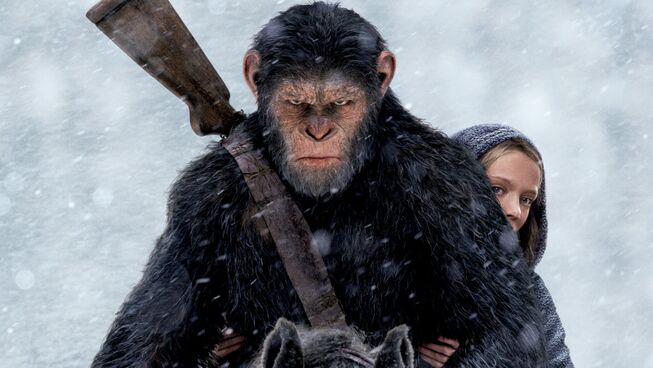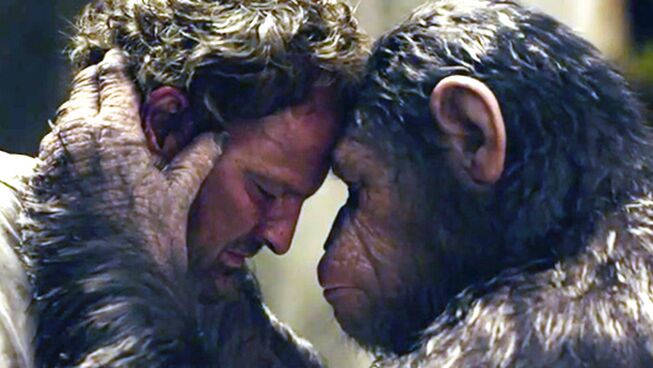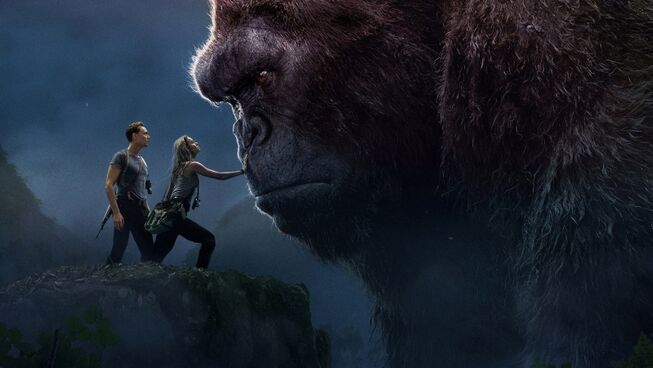
2.5 out of 5 stars
The war between humanity and the world of apes had come to a head in Dawn of the Planet of the Apes. Caesar (Andy Serkis) continues to lead the band of apes that have established a fortress in the mountains surrounding the remnants of San Francisco. A rebellious faction breaks off from the band of apes and decides to side with the army of humans that continue to hunt the enhanced breed of primates. Even though the leader of the ape world desires to live in peace and separate from humanity who are to blame for their existence as speaking beasts. The problem with this plan is that humanity cannot let the apes merely disappear. The Colonel (Woody Harrelson) leads the remaining army that is on the hunt for Caesar’s community and after discovering their hideout, disaster besets the beasts of the forest. This is the catalyst for the migration of the apes into the interior of the country and leaves the leader of the primates with the decision to face his enemy and end the feud between their species.
Director Matt Reeves (Dawn of the Planet of the Apes) has been given the responsibility of concluding this chapter of the Planet of the Apes. The Caesar trilogy has been an effective lead up to an ongoing franchise of films that will pit humanity against a world of apes. There has been a two-fold brilliance in this lead up to an eventual reboot of the 1960’s saga. With the blame for the existence of this advanced race of beasts being squarely in the hands of mankind’s messing with nature and the performance of Andy Serkis as the leader of the apes, this has been an excellent set up for the future.
This is not the best of the three films, but it maintains the level of intensity within the storyline and is complemented with superb effects that will move the franchise forward. With the need to connect things to future episodes, it lacked the heart of the second film. The inevitable comparison does not stop, because Reeves has to live up to the brilliance of his former instalment in the franchise and unfortunately one of the missteps was Woody Harrelson as the villainous Colonel. He has become a mainstay in a multitude of successful cinematic outings over the years, but lacks the depth of performance that was provided by Gary Oldman in the last outing.
Even with these weaknesses, the production team has managed the slow progression of the narrative with masterful strides by creating a compassion for both sides of this epic battle. The story and effects rely on this new era of motion-capture acting that is led by Serkis. He has provided the heart of this series and he does not disappoint with the conclusion to his involvement in the franchise. Even with the digital effects, ironically he proves that there is still need for a human element to deliver true emotion and for it all to be believable. This is proven with the inclusion of Steve Zahn as Bad Ape, who was a welcomed addition to the team and provides the levity to a dark and weighty message.
War for the Planet of the Apes provides a satisfying conclusion to the volume of The Planet of the Apes. This has been a surprisingly enjoyable ride into this post-apololytic world and manages to develop a curiosity for where this world will go into the future.
REEL DIALOGUE: What are some of the bigger questions to consider from this film?
“Blessed are the merciful, for they shall receive mercy.” Matthew 5:7
The word mercy is used extensively throughout War of the Planet of the Apes by both sides of the battle between man and ape. There were outward portrayals of mercy and examples of mercilessness shown on screen. It is an element of the film that could lead to some confusion on what it really means to be merciful.
The dictionary definition of mercy is to show compassion toward an offender or an enemy.
It is a word that is at the heart of the message of the Bible. Even with the failings of mankind and our outward rejection of God, the being that breathed life into all of the world is a merciful being. Throughout history, society has tried to push aside God or has not been willing to honour him for all that he has provided. This puts humanity into the position as enemies. Even though we deserve judgement, punishment and rejection, God does an amazing thing. He offers mercy through the work of Jesus.
It is hard to imagine that a story about a battle between apes and humans could potentially point to God, but it is subject that is hard to miss. He is truly the example of supreme mercy that is unmatched in human history.
Passages to consider on the subject of mercy: Psalm 103, Luke 6:36, James 2:13






